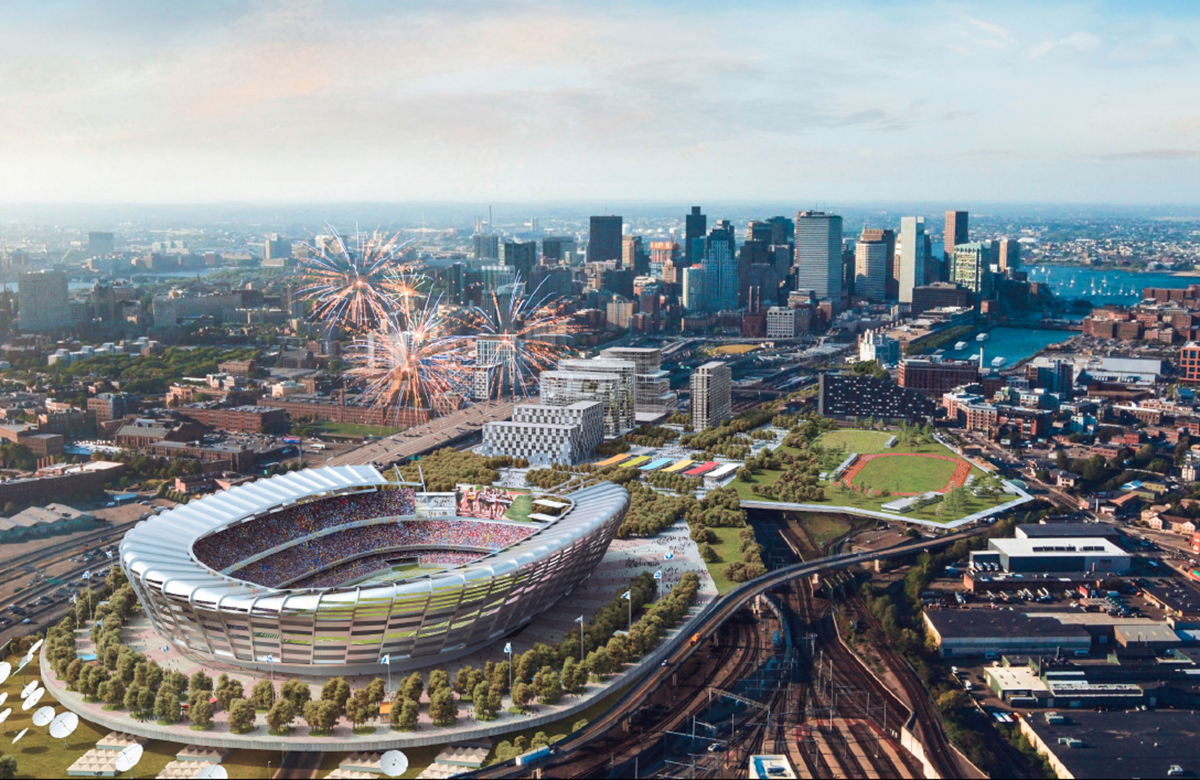Boston 2024 Unveils Bid 2.0 with Some Questions Still Unanswered

Rendering via Boston 2024
Boston 2024 leaders unveiled the second iteration of its Olympic bid at the Boston Convention and Events Center on Monday after its “proof-of-concept” first draft faced months of media scrutiny, public hostility, and political pressure for more concrete details of the $10 billion endeavor.
Chairman Steve Pagliuca led with the bid’s financial plan, boasting $5 billion in operating revenue with an expected expected $210 million surplus, as well as $128 million in insurance premiums. Pagliuca said the bid has engaged in “substantive discussions” with several willing insurers, with more details regarding a “four-layered” protection plan for taxpayers to be published in the coming days.
Boston 2024 is still searching for venues for eight events—most notably, the controversial velodrome has been included in the bid’s budget, but still lacks a home. Pagliuca said the public can expect versions 2.1 and 2.2 in the near future with expanded information.
The bid hopes to create 4,100 jobs from 2018-2023, 54,300 in 2024, and 2,200 in 2025 and beyond. It plans for 8,000 total new apartment units between the Widett Circle and Columbia Point projects—4,000 in Widett Circle, with a minimum of 520 affordable housing units; and 3,000 in Columbia Point, with a minimum of 390 affordable housing units, 500 senior housing units, and between 900-1,00 student housing units.
“The key to this plan is the reconfiguration of K[osciuszko] Circle,” architect David Manfredi said, alluding to the traffic-plagued Dorchester roundabout, which would be a critical artery for transportation in the bid’s plans. Despite the updated bid’s sprawl across the state in search of broader public support, Manfredi said 30 Olympic events will still be held in Boston. He emphasized the bid’s compactness, comparing Boston’s 125 sq. km. between venues to Tokyo 2020’s more that 2,000 sq. km.
Boston 2024 CEO and former MassDOT secretary Rich Davey painted a grim future for the nation’s oldest subway system, projecting that T ridership would reach 51 percent over-capacity without Boston 2024 and the transportation projects tied to the Games. With these improvements, the bid expects this number to drop to 16 percent. Of its proposed transportation improvements, $215 million would be Games-specific and privately funded, while Boston 2024 would pick up the tab for an additional $72 million.
Following the presentation, Davey said Boston 2024 would not be seeking additional capacity on the state’s highways, arguing that the stress placed on them by the Olympics would be no different than events at Gillette Stadium in Foxborough or the DCU Center in Worcester.
Responding to earlier questions raised over security issues, Davey said the bid would seek a “National Special Security Event” designation from federal agencies, the same held by the Super Bowl and other mega-events. The process to obtain this status would begin with a request from Gov. Charlie Baker.
You can view Boston 2024’s Bid 2.0 here.


